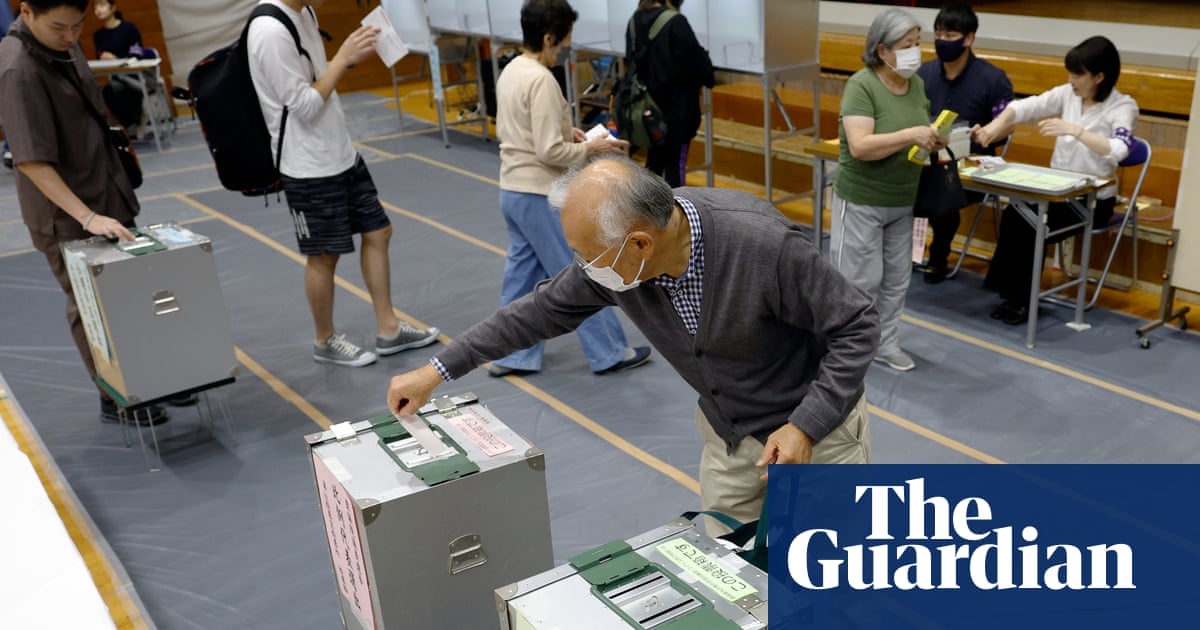Japan’s ruling coalition could lose its majority in parliament in Sunday’s general election, according to exit polls, after taking losses amid voter anger over a funding scandal and a cost of living crisis in the world’s fourth-biggest economy.
A poll by the national broadcaster NHK showed that the Liberal Democratic party (LDP), which has ruled Japan almost without interruption since the mid-1950s, and its junior coalition partner, Komeito, were on course to win between 174 and 254 of the 465 seats in the lower house of parliament.
The main opposition Constitutional Democratic party (CDP) was predicted to win 128 to 191 seats. The outcome may force the LDP or CDP into power-sharing agreements with other parties to form a government. The official result is not expected until Monday morning.
The LDP’s ability to form a government will depend on whether it can continue as the senior partner in a coalition with Komeito, a much smaller party that was also projected to lose seats. The two parties together need 233 seats to retain a majority.
While the result is not a repeat of the political seismic shock of 15 years ago – an unprecedented defeat for the LDP – it has left the party significantly weakened and will raise questions about the future of the recently installed prime minister, Shigeru Ishiba.
Ishiba had warned that the LDP had work to do to regain public trust after months of controversy over MPs’ undeclared slush funds. “We want to start afresh as a fair, just and sincere party and seek your mandate,” he told supporters on the eve of the vote.
Ishiba, a former defence minister, became the party’s president – and Japan’s new prime minister – last month after his predecessor, Fumio Kishida, announced he was stepping down to take responsibility for the funding scandal.
Dozens of LDP lawmakers were found to have siphoned unreported profits from the sale of tickets to party gatherings into slush funds.
Several senior figures were disciplined, and the party withdrew its support for several candidates in Sunday’s vote – moves that failed to repair the damage inflicted by the funding scandal.
Ishiba, who is battling low approval ratings just weeks into his premiership, was wrongfooted days before the vote when the media reported that the party had given millions of yen in campaign funds to local party chapters whose candidates had lost the party’s endorsement.
Japan’s longsuffering opposition was pinning its hopes on the scandal triggering a repeat of the 2009 lower house election, the last time the LDP was deposed.
The CDP leader, Yoshihiko Noda, accused the LDP of ignoring the needs of ordinary people, as polls said most voters wanted action on rising prices, as well as tax cuts and wage rises. “The LDP’s politics are all about quickly implementing policies for those who give them lots of cash,” Noda told supporters on Saturday. “But vulnerable people have been ignored.”
Takeshi Ito, a 38-year-old voter, said he would support the LDP in the absence of a viable alternative.
“Even if I were to switch to an opposition party, it’s still unclear whether they could push forward reforms, and I don’t know if I can trust them or not at this point,” Ito said. “I want to see the party in power continue to move forward.”

